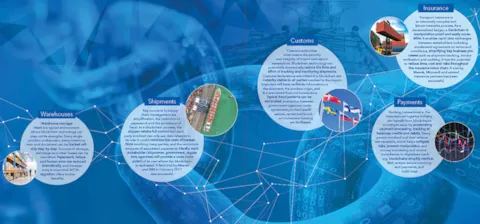Blockchains in the shipping world
The ability to reduce trade documentation, processing costs, delays, data manipulation, fraud and human error through uncompromisable “smart contracts” makes blockchain technology attractive to the shipping world.
Blockchain is a digital distributed ledger technology: business transactions of any kind are recorded in sets or “blocks” of data that build upon each other logically, similar to the entries in a ledger. Every transaction is time-stamped and encrypted. Multiple instances of this electronic ledger reside on many networked computers or “nodes” that are constantly synchronized and verified automatically using hash technology, comparable to the checksum method. Any attempt to manipulate existing records would be futile since discrepancies between the many instances of the same ledger will be detected immediately.


Blockchain technology allows transactions to be tracked and traced infinitely, can be used in any business transaction and holds great promise for industry sectors involving multiparty or high-value transactions such as logistics, supply chain management, finance, food and insurance. A well-known implementation of the blockchain principle is the cryptocurrency Bitcoin, which has never been compromised since its introduction in 2009.
Svante Einarsson
Head of Cyber Security Advisory EMEA, APAC & Maritime